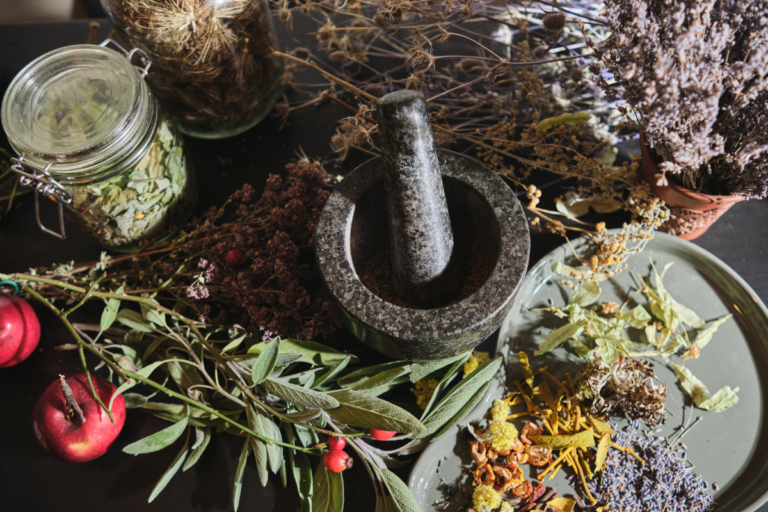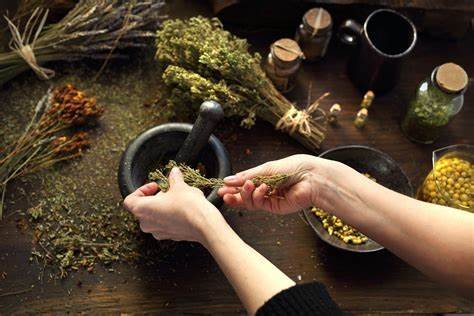How Herbalists Use Plants for Healing
Herbalism has been practiced for thousands of years, with herbalists relying on plants to treat a wide variety of health conditions. These skilled practitioners have a deep understanding of plant properties, often utilizing them for healing purposes in natural and holistic ways. In this guide, we’ll explore how herbalists use plants for healing, the methods they employ, and the benefits that plants can offer for both physical and emotional well-being.
1. Identifying Medicinal Plants
Herbalists are highly skilled in identifying plants with medicinal properties. They rely on both traditional knowledge and modern science to recognize plants that are effective for specific health concerns. Some plants are well-known for their healing properties, while others may be less commonly used but still valuable in certain treatments.
Common medicinal plants used by herbalists include:
- Chamomile: Known for its calming properties, it’s often used to aid sleep and relieve anxiety.
- Echinacea: Typically used to boost the immune system and fight off colds and infections.
- Lavender: Famous for its relaxing and stress-relieving effects, often used in aromatherapy.
Herbalists have extensive knowledge of the plants in their local areas and can differentiate between safe and toxic plants, which is crucial for successful healing.
2. Methods of Preparation
Herbalists use various methods to prepare plant-based remedies, depending on the plant and its intended use. Some of the most common methods include:
- Infusions: Plants like leaves, flowers, and soft stems are steeped in hot water to extract their medicinal properties. This method is commonly used for herbs like chamomile or mint.
- Decoctions: Harder parts of the plant, such as roots, bark, or seeds, are simmered in water to extract their beneficial compounds. Common decoction plants include ginger and licorice root.
- Tinctures: In tincture preparation, herbs are steeped in alcohol (usually vodka) to extract their active compounds. The alcohol serves as a preservative, allowing the tincture to last for months or even years. Tinctures are potent and typically used for more concentrated treatments.
- Salves and Ointments: Some plants are used topically to treat skin conditions, wounds, or inflammation. Herbalists make salves by infusing plant oils (like olive or coconut oil) with herbs and then mixing them with beeswax for a thicker consistency.
- Powders: Dried plant material can be ground into powder, which can be consumed directly, added to capsules, or mixed into teas for easy use.
Each preparation method helps to extract specific properties from plants, whether it’s essential oils, alkaloids, flavonoids, or other active ingredients.
3. Healing Through Holistic Approaches
Herbalists often take a holistic approach to healing, considering not only the physical symptoms of an illness but also emotional, mental, and spiritual well-being. They understand that the body, mind, and spirit are interconnected, and this understanding influences their treatment methods.
For instance, while herbs like valerian root may be used to treat insomnia, an herbalist might also suggest lifestyle changes such as reducing stress or implementing relaxation techniques. This approach is essential in treating chronic conditions and in maintaining long-term health.
Herbalists may also advise clients on proper nutrition, exercise, and stress management to complement the use of medicinal plants, ensuring that healing happens on all levels.
Herbal Remedies and Natural Wellness
HerbalBear.com may offer herbal remedies and natural wellness products. For a different kind of engaging online experience, discover online casino real money. Experience the thrill of online games.
4. Plants for Emotional and Mental Health
Many plants are used by herbalists to support emotional and mental health, providing relief from anxiety, depression, and stress. These remedies are often combined with other therapies like mindfulness and meditation for a more comprehensive approach.
- St. John’s Wort: Known for its antidepressant properties, this herb is commonly used to treat mild depression and anxiety.
- Ashwagandha: A well-known adaptogen, it helps the body manage stress and balance hormone levels.
- Passionflower: Often used to calm the nervous system and treat anxiety and insomnia.
Herbalists understand that mental health is just as important as physical health and use plants to help manage emotional well-being naturally.
5. Using Plants for Immune Support
Herbalists often recommend plants for boosting the immune system, helping the body fight off infections, and preventing illness. They choose plants that have antibacterial, antiviral, and anti-inflammatory properties.
- Elderberry: Known for its antiviral properties, elderberry is often used to prevent or treat colds and flu.
- Ginger: An anti-inflammatory herb, ginger is often recommended to reduce symptoms of colds, ease digestive discomfort, and promote overall immune function.
- Garlic: With its natural antimicrobial properties, garlic is a popular plant for supporting the immune system and fighting infections.
Vivez l’Expérience Unique de la Roulette en Ligne
Les amateurs de jeux raffinés trouveront leur bonheur avec casino la riviera roulette en ligne. Cette plateforme offre une ambiance élégante et authentique, inspirée du charme des casinos français. Les joueurs peuvent profiter de diverses options de roulette, alliant divertissement et réalisme. Une destination idéale pour ceux qui recherchent une expérience de jeu sûre et immersive.
6. The Role of Herbalists in Preventive Medicine
Herbalists also play an important role in preventive healthcare. By recommending herbs that support the body’s natural defenses and balance, herbalists help individuals maintain health before illness strikes. Some herbs can strengthen the immune system, detoxify the body, or improve circulation, thus promoting overall health.
For example, herbs like dandelion and milk thistle are commonly used for liver detoxification, while hawthorn is often recommended to promote heart health and circulation.

7. Combining Modern Medicine with Herbal Remedies
Herbalists often work alongside conventional medicine practitioners, offering complementary treatments. While herbs are not a substitute for professional medical care, they can provide valuable support in managing chronic conditions or speeding up recovery from illness.
For example, herbalists may recommend turmeric for its anti-inflammatory properties to complement treatments for arthritis, or ginger for nausea relief during chemotherapy.
jackpotjill Portal
Herbal Bear celebrates natural learning and holistic growth. In a similar way, jackpotjill Portal cultivates enriching entertainment that balances fun with responsible enjoyment—encouraging a positive, rewarding experience.
Conclusion
Herbalists have a deep understanding of the healing properties of plants, using them in a variety of ways to treat both physical and emotional health issues. By combining traditional knowledge with modern practices, herbalists offer holistic solutions for a range of conditions. Whether it’s through teas, tinctures, or topical remedies, plants continue to be a valuable tool in natural healing, empowering individuals to take control of their well-being. With the right guidance and knowledge, the healing power of plants can support both short-term and long-term health.



